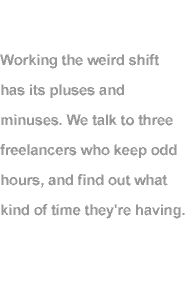 |
|
||||||||||||
 |
|
||||||||||||

|
|
||||||||||||
|
By William Hogeland
|
Nine to five. Three little words sure to make most red-blooded freelancers shudder. They speak of the bleak routines of corporate hell. Nine to five doesn't refer merely to the hours in a workday; it means punching in and punching out... clock watching... predictability... lives slipping away in meaningless repetition. Of course many IPs work regular corporate hours -- sometimes even as a matter of choice. But others go all night, or rise long before dawn. Depending on a variety of factors -- including relationships with clients and the schedules and support of family members -- life in the world of "backward scheduling" can offer real rewards. But working unorthodox hours can also be a real pain in the rump. Syncopation
For Will Woodard, a jazz bassist, late hours are a given. "That's just when the work is," he says. A member of the well-regarded Rick Hollander Quartet, which records for the Concord Jazz label, Will has toured widely in both Europe and the States. But when his first child was born, Will stopped traveling. Now he cares for his two young sons during the day -- Will's wife Rosalie is a teacher -- and plays up to 25 dates a month in New York, where he lives. "I'm really a freelance accompanist," Will explains. "You take whatever there is, whenever it is." His services are in frequent demand. He's played in a quartet led by sax player Vincent Herring and with piano legend Mose Allison, and he's a seasoned veteran of heading to bed at 2:00 or 3:00 in the morning. Juggling nighttime work and daytime responsibilities -- that's when things "can be rough. Music is part of my life all the time. During the day I'm doing business on the phone, and practicing has to happen during the day." Trying to care for Calvin and Patrick while doing all of that might have made both work and home life unsatisfying.
But Will finds creative ways to integrate the two parts. "[He and his kids] have breakfast, and after getting showered and dressed we turn on the record player. I might play a little bass; they might bang on a drum or just crawl around beneath me. And I very carefully guard the time when they're napping to get some focused practicing done." Will's unorthodox lifestyle lets him spend more time with his kids than many parents can. ("My wife," he also hastens to add, "is a paragon of patience and virtue.") For all the demands on his family's ingenuity, Will speaks for many IPs when he says: "I've always been very aware that I'm not on the normal pace that other people are on. And I've got to say that I'm thankful for that, every day." Virus Fighting at Night Unlike Will, Chris Drury was recently an IP on a "normal" schedule: ten to six. Then, about a month ago, he started working for a new client, an investment firm with two busy trading floors, and he adopted new hours -- 4:00 p.m. to 1:00 a.m., sometimes later. As an information-technology consultant, Chris is part of a team responsible for making desktop computers safe from what he terms "the unique individuals who want to wreak havoc in corporate America and are trying to come up with the newest and greatest virus." Unfortunately, financial traders don't appreciate being told to log off to accommodate an upgrade. ("Traders are among the most demanding clients that an IT professional can deal with," Chris points out with diplomatic understatement.) Nights were the only feasible time for the project. Actually, Chris volunteered for the night shift. On his regular schedule, he'd endured a brutal commute, rising at 4:30 a.m. and bussing two hours or more each way due to traffic. "I thought: if I take this opportunity, chances are that I can spend more time with my wife. And I've had breakfast and lunch with her every day this week." "But," he adds ruefully, "I haven't had dinner with her since the weekend." Chris has mixed feelings about his new schedule but enjoys its benefits. Working nights has indeed pared the commute: he rides to work against traffic. He now gets home at about 2:00 in the morning: "the company was nice enough to provide a car and driver. The ride takes an hour and ten minutes." Chris actually gets more sleep than when working the day shift.
At night, Chris is better able to focus on the antivirus project. "I'm a little sharper. During the day, I was running to replace a keyboard, or somebody had a mouse problem, or somebody needed help with this or that. We have a couple of trading floors plus an operations department, accounting, legal, and other overhead-type departments; they all needed various levels of attention. If they had an issue, they wanted it resolved twenty minutes ago. "Now I don't have to deal with outside distractions. All the traders
are gone. There are three of us, and I just move from PC to PC and do
what I have to do. The mood is..." He thinks a minute. "Serene, really." |
||||
|
|||||
|
August 7, 2000 Primary Editor: Ken Gordon Illustrator: Lawrence San and Fletcher Moore Production: Fletcher Moore |
We'd love to hear your comments about this article! William Hogeland is a freelance writer who lives in Brooklyn, NY. If you like, we'd be happy to put you in touch with him, or with any of the other IPs named in this article. |
||||
|
|
|||||